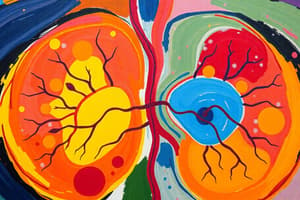Podcast
Questions and Answers
What is the primary function of the thymus?
What is the primary function of the thymus?
- Filtration of blood
- Storage of lymph fluid
- Production of antibodies
- Maturation of T lymphocytes (correct)
Which structure primarily supports the cells of the thymus?
Which structure primarily supports the cells of the thymus?
- Dense connective tissue capsule
- Fine reticular fibers (correct)
- Adipose tissue
- Epithelial network
During which life stage does the thymus begin to involute?
During which life stage does the thymus begin to involute?
- At birth
- In late childhood
- In early adulthood
- At puberty (correct)
Which of the following tissues does NOT contain lymphatic vessels?
Which of the following tissues does NOT contain lymphatic vessels?
Which of the following cells is NOT found in the cortex of the thymus?
Which of the following cells is NOT found in the cortex of the thymus?
What is the primary function of the thoracic duct in the lymphatic system?
What is the primary function of the thoracic duct in the lymphatic system?
Where does the right lymphatic duct terminate?
Where does the right lymphatic duct terminate?
Which of the following best describes the flow of lymph in the lymphatic system?
Which of the following best describes the flow of lymph in the lymphatic system?
What is the composition of chyle in lymphatic vessels from the small intestine?
What is the composition of chyle in lymphatic vessels from the small intestine?
Which component of the lymphatic system begins as porous, blind-ended vessels?
Which component of the lymphatic system begins as porous, blind-ended vessels?
Flashcards
Lymphatic System
Lymphatic System
A network of vessels that collect excess fluid from tissues and return it to the bloodstream.
Lymph
Lymph
The fluid that circulates through the lymphatic system, collecting waste and immune cells.
Lymph Nodes
Lymph Nodes
Small, bean-shaped organs found throughout the body, filtering lymph and containing immune cells.
Thoracic Duct
Thoracic Duct
Signup and view all the flashcards
Right Lymphatic Duct
Right Lymphatic Duct
Signup and view all the flashcards
What is the thymus?
What is the thymus?
Signup and view all the flashcards
What are the two regions of the thymus?
What are the two regions of the thymus?
Signup and view all the flashcards
What are epithelial reticular cells and what is their function?
What are epithelial reticular cells and what is their function?
Signup and view all the flashcards
What is negative selection in the thymus?
What is negative selection in the thymus?
Signup and view all the flashcards
What is the role of the thymus in immune tolerance?
What is the role of the thymus in immune tolerance?
Signup and view all the flashcards
Study Notes
Lymphatic System Overview
- The lymphatic system carries excess extracellular fluid back to the venous system
- Lymph is clear, colorless fluid; chyle is milky lymph from the small intestine
- Lymphatic vessels are present in most body areas except the brain, bone marrow, and avascular tissues (epithelia and cartilage)
- Lymphatic flow is unidirectional due to valves in the vessels
Lymphatic Organs and Tissues
- Lymphatic organs include lymph nodes, lymphatic vessels, and lymphatic ducts
- The lymphatic system includes primary, secondary, and diffuse lymphoid tissue
- Lymph nodes filter lymph and contain germinal centers for B cell proliferation
- The thymus is a primary lymphoid organ where T lymphocytes mature
- The thymus involutes (shrinks) after puberty
- The thymus has a cortex and medulla, with Hassall's corpuscles in the medulla
- Lymph nodes have a cortex, paracortex, and medulla
- Lymph nodes contain lymphatic nodules (primary and germinal) with B lymphocytes and macrophages
- Lymph nodes filter lymph, identify foreign antigens, and initiate an immune response
- Lymphatic vessels form a network connecting lymph nodes and ducts that drain lymph into veins
Lymphatic Circulation
- Two major lymphatic ducts: thoracic duct (drains most of the body) and right lymphatic duct (drains the upper right quadrant)
- The thoracic duct begins in the cisterna chyli and drains lymph into the junction of the left subclavian and internal jugular veins
- The right lymphatic duct is smaller and drains lymph into the junction of the right subclavian and internal jugular veins
Lymphatic System Function
- Filtration of lymph: Lymph passing through nodes allows macrophages to remove pathogens and cellular debris.
- Antigen recognition: Specialized cells in lymph nodes (dendritic cells) present antigens to T and B cells, initiating immune responses.
- Humoral immunity: B cells differentiate into plasma cells producing antibodies that target foreign antigens
- Cell-mediated immunity: T cells target and destroy infected or cancerous cells
- Lymph nodes act as sites of antigen recognition, cellular proliferation and differentiation.
Clinical Correlations
- Lymphangitis: Inflammation of lymphatic vessels, often from infection
- Lymphadenitis: Inflammation of lymph nodes, often due to infection or malignancy
- Lymphedema: Localized swelling due to impaired lymphatic drainage.
- Cancers can spread through lymphatic systems or nodes
Studying That Suits You
Use AI to generate personalized quizzes and flashcards to suit your learning preferences.




